Emeka Ogboh: The City is the Composer
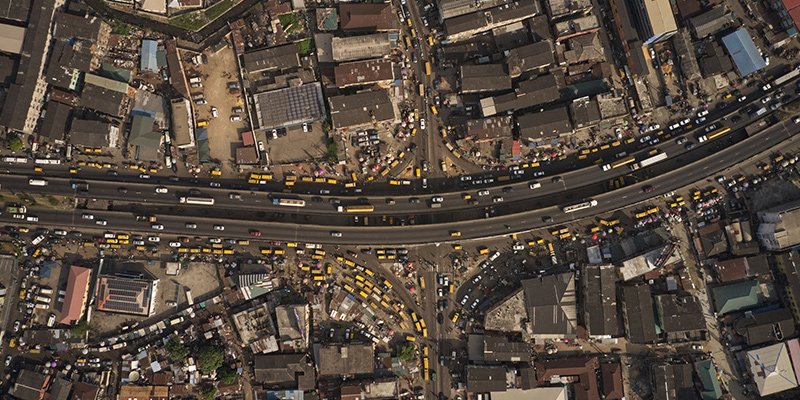
There’s been a lot of talk about Emeka Ogboh since he entered the music world. Following a move to Berlin, the Lagos, Nigeria-born sound and installation artist began listening back to old field recordings he’d amassed of his hometown and adding music to them. He shared some of these compositions in an exhibition in Paris and another in Berlin. Ostgut Ton (the label of Berghain club) soon found out about this musical branch of his work and called up to see if he’d release a record on their ambient sub label A-TON. The result was 2021’s Beyond the Yellow Haze. It was widely praised for the way it weaved light melodies and rhythms through Lagos’ crowded soundscape. And the following year, Ogboh put out another album – on his own label Danfotronics this time – which homed in on a very specific place in Lagos; the neighborhood of Ojuelegba and its busy bus station which, as per the album title, resides precisely at the coordinates 6°30′33.372″N 3°22′0.66″E.
Both releases were critically acclaimed for their transportive qualities and Ogboh’s deft production. Amazingly, prior to undertaking these projects, Ogboh had never produced music – and when I speak with him he repeatedly tells me he’s not a musician; but rather acts on intuition. So over a couple of hours on video call, I tried to learn how, as someone new to the craft, he has managed to make such an impactful contribution to the world of electronic music.

Emeka Ogboh in front of one of his sound installation works
You've mentioned elsewhere that you had these recordings of Lagos stored up for quite a while, but what was the impetus to start making music with them and did you not find this a daunting task?
I wouldn't say it was a daunting task, because I've been working with sound for a while. Maybe not making music, but editing sound, placing it, layering it. It’s similar to making music in that sense. Your sense of hearing is intuitive – you can feel how long a piece should be, how it's going to start, the midpoint, and how it's going to end. A lot of people just use just their ears when they're making music, but I put my body into it. How does it make my body feel? So that’s what I learned from sound installation and why I kind of had this gut feeling that I could make music, that I could compose. But I didn't know how to operate the software – that's when I took an electronic music production course to learn how to use Ableton Live. I know there are all these tutorials online but I just needed some kind of hands-on experience.
What were you using to edit your field recordings?
Everything to do with field recordings, I do outside of Ableton. I used Adobe Audition to edit my recordings then I put it in a folder, imported it to Ableton and started pulling it all together. I really love Ableton’s Preview function where you can click a sound while the music is playing and you can hear it over the music.
Do you have a set way of sorting and organizing your field recordings before you start?
Not really, but the categories of soundscapes are anthropophony, biophony and geophony. Urban sounds fall under anthropophony, which is the sound that humans make, compared to biophony made from animals and geophony made from weather. For Lagos, everything is under anthropophony. Past that, it's really about sorting it into stuff like, this recording is from the market, this one is from the bus station. Or when I record people directly in interviews, it's organized into things like “conductors”, “hawkers”, “street sellers”, whatever. The main thing [for the Ojuelegba album] was the category of bus stations, then I put the dates and the time on them and that's it.
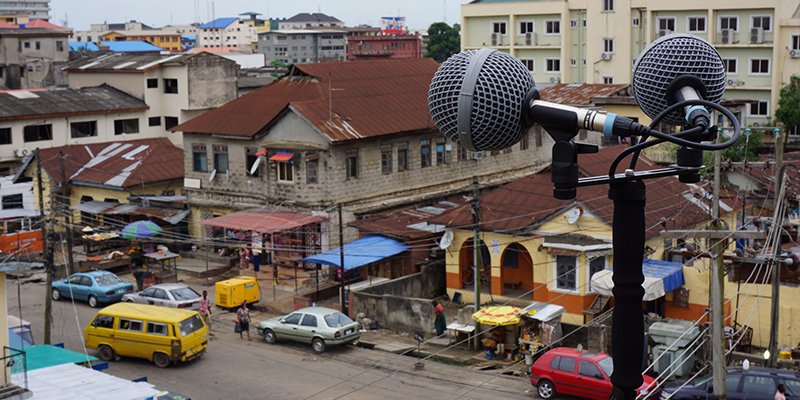
Part of Emeka Ogboh’s recording set-up at Ojuelegba station in Lagos
Where would you take it from there? What would the process be to turning those field recordings into a piece of music?
For me, the process always starts with going through my hard drives, listening to stuff and then choosing excerpts. Out of a 2-hour recording or 1-hour recording, I could choose a 25-minute excerpt that I find interesting or which speaks to what I’m trying to do and embodies the whole [feeling of that] space. Then I’ll put it on loop and use these noise cancellation headphones and just focus on that excerpt. I could do this conscious listening for maybe an hour or 2 hours. Then I’ll start feeling the music coming out. I might even get my voice recorder and start trying to hum the music back while the recording is playing in my ear.
So you do hours and hours of deep listening, and that informs the music?
That's the first step. And then I slowly start pushing the field recordings to the background. I start dropping the volume in certain parts and letting the music take the foreground. It’ll still be that 25-minute recording – I don’t chop it up – but I just kind of have it louder in certain parts and then either it goes silent or fades into silence and picks up again later. So I would layer down that chunk of a field recording and start placing the music on top. But it’s not one clear-cut process. I’ve had it where I’ve ended up with three different pieces of music from one recording.
And different moments in the same recording can inspire different songs?
Yes. Well, actually it was more like a lot of those songs were inspired by the conversations I had with the bus drivers. One guy might be talking about Ojuelegba and how they love it and how Ojuelegba never sleeps. Then throughout those field recordings I'm looking for that same energy which resonates with what he's talking about.
How do you then make the music complement that energy?
This was the hard part, trying to use these people as musicians. Sometimes I’ll want the samples to lead the drums – like their voices will interject and then I’ll throw in some instruments. I want it to feel like an ad lib, where one of the recordings throws in something which then triggers the music. Like on 'No Counterfeit', you hear the guy going: "another Ojuelegba is a counterfeit - nooo!” I loop that then the drums hit. It's all about playing around with these elements in the soundscapes and trying to make music for it.
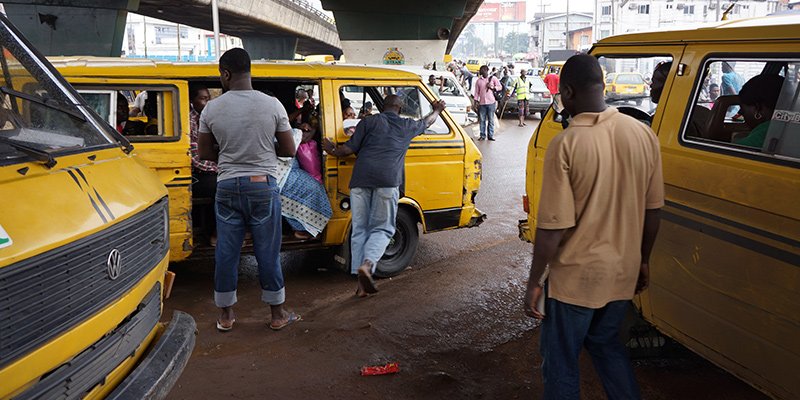
Perpetually busy Ojuelegba bus station
How did you keep it true to Lagos? Was it important for you to not let the music dominate too much?
One thing that I realized from the start is that I always saw the city as a composer, and I am the documenter of the compositions. So it's not like me trying to impose anything on the city. Instead, the city imposes on me. I follow, I listen to the city and have it impose on me what to do. Every city is a composer in its way, but what you hear is different because of certain rules and regulations. In Lagos, we have no [noise pollution] laws. Or at least they’re not enforced. So people use their horns habitually, any way they want to. The bus drivers will go and buy horns that are musical to attract attention so people get on their buses. There's really no rules for how they should do this. So I try to apply the same thing when I'm making my music. I'm going to be that no-rule musician.
How would you describe these albums? Would you say they’re like a private audio diary that you’re allowing the listener to share in, or a public document of a place and time?
I think it's both of them. With field recordings, if you've not been in that place, you may not be able to grasp it fully, but you can get an idea of what it might feel or look like based on what you hear. For someone that knows it, it's completely different. The field recordings become more of a reminder of this place that they've been to. And there are many emotions that could come out of that. I remember one time I did an installation of a Lagos market in Washington DC and this lady, who’d been to that market, walked up to me and was like, “I’ve never been back to Lagos, but this takes me back to that market. And not only does it take me back to that market physically, but it also kicks up [familiar] smells.” So that's the thing about the sound of a place, it kicks up a lot of stuff: it's transportive, it's immersive, it's emotional.
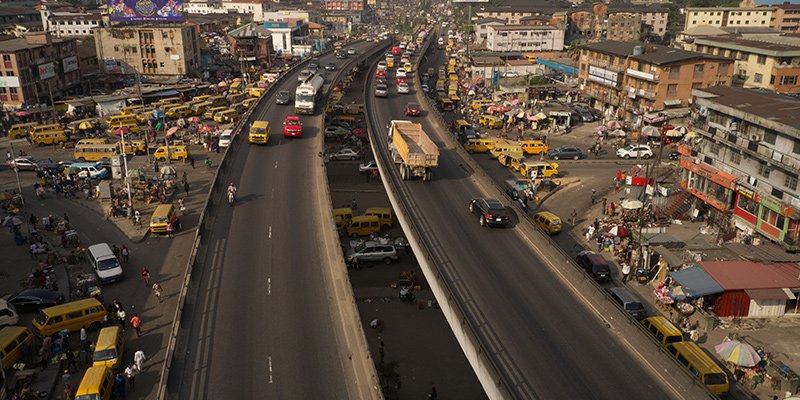
Ojuelegba station – one of Lagos’ main transportation nodes
It’s like audio travel. Does the sound of a place inherently question the listener's capacity to be open to different ways of being and living?
It's really about how tolerant and how open you are to experiencing new stuff. Some people, even when they don't like it or it's harsh to them, are still open to it because it's different. I'm always genuinely blown away when people are like, “Oh wow! We love your music! We love Lagos!”
But it also depends on your mood. Sometimes when I'm traveling, I'd rather stay in my hotel because of jet-lag or just because I want to just chill and lie down. Human beings are emotional and sound is one medium that you can use to probe those human emotions and get reactions.
At what point do producers using field recordings run the danger of exoticizing a place? For example, I could be inspired by your work to go out to São Paulo and try and capture its atmosphere and make it into an album, but surely, as someone who is not from there, I run the risk of exoticising the place and its people?
It depends on how you want to use it and what you want to convey and express. I see field recordings more like an anthropological thing – digging into a place to know a place. The music could help you do that because maybe in the process of making the music, you spend a lot of time actively listening, trying to identify and pick out sounds. In that way you’re taking an anthropological dive to understand the place. That’s not exoticizing. But if you just want to identify a certain sound because you think it sounds cool, like when a [foreign] language appears in music and you highlight it without knowing what they're saying, that’s exoticising.
So I guess, in a way, your work encourages the listener to engage fully with a place.
It's about you being respectful. Lagos is my city, so I can just record it anytime because I know what to expect. But other [new] places, I may not necessarily go and get recordings on the first day. I go out on my own because I want to listen. I want to see what attracts my attention. I like trying new food so I might walk into an open air restaurant or open air market, eat there, and then pay attention to what’s going on around me. A lot of people spend the whole day behind their lens and then it's only when they get back home and start going back through the pictures that they realise the things they missed. I'd rather be there fully and maybe something triggers my interest and I come back and try to record it later.
And how do you go about catching these field recordings?
I try to be discreet and there are two reasons for this which Lagos taught me: one, when the bus conductor sees you trying to record, he may start performing. I prefer recording them the way they are in their natural state of flow, without them trying to add extras because they want to perform and start clowning. Then two: in Lagos, these bus stations are patrolled by certain people and if they see you working in their space, they're going to tax you.
So that’s why I really like the binaural microphones – earpiece ones like the Sound Professionals SP-TFB-2 or Soundman OKM II – because they help me to be as discreet as possible. I'm 6ft 6, I stand out. Imagine being this tall and just standing in the middle of public transport for like 20 minutes straight. I need to blend in as much as possible.
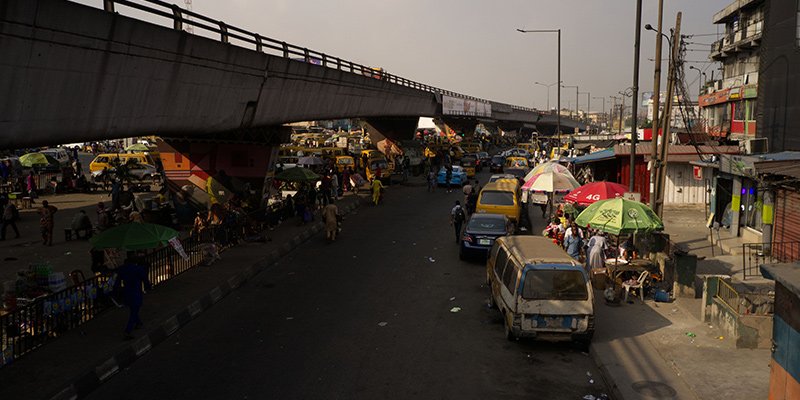
Ojuelegba station also serves as an open-air market
As someone who knows Lagos well, were there any sounds you were surprised by in Ojuelegba?
What blows my mind most is the voices of the conductors and how they play with the pronunciation of the bus routes. It's almost like freestyle rap the way they tweak the words. There’s a lot happening in the soundscape and they want to attract your attention to them, so they have to play with [the words]. Like when you hear how they call Ikeja – a district in Lagos – it’s like, "Ikejakejakejakejakejaaa!"
Even the hawkers sing their words: "Gala" is this kind of sausage roll they sell, but the hawkers go like "Galagalagalagalaaa". It always blows my mind how they do it.
You might not pick it up when you're recording because there's a lot going on. But when you’re listening back, you hear it and it's so beautiful: the voice, the pitch. If I was a talent scout, personally, I’d go there and find them, because their voices are mind blowing.
I felt like 'Oju 2.0' was the moment I could appreciate that the most on 6°30′33.372″N 3°22′0.66″E. I could listen fully.
I kind of like how that track played out there. I'm sure it's also the track many people probably skip because they're looking to listen to music, but I'm happy having only field recording tracks in there. It comes back to what I was saying about the city being a composer; this album is composed by the city. By bringing together different people in this space and letting them be who they are without fear of prosecution for how they're using their horns or playing loud music or how they’re trying to sell bootleg CDs or draw passengers into their buses or screaming out the names of their wares. It's that space where people are who they are – they're hustling.
It bridges the gap between your sound installation and your music. I probably wouldn't have come across you if it wasn't for these albums.
Totally. That's why I'm really happy in many ways that 6°30′33.372″N 3°22′0.66″E was a success. I'm not saying that everyone loves my album, but it’s given me more ideas. Like now I want to apply my visual art to it. I want to create an installation with multiple projections which gives you that same experience [of being there]. I've commissioned some videographers and they’re shooting Ojuelegba at the moment at different times of the day, from different angles. Then we’ll see what comes out. I want to keep pushing things.
Follow Emeka Ogboh on Bandcamp and his website
Text and interview: Joseph Francis
Photos courtesy of Emeka Ogboh